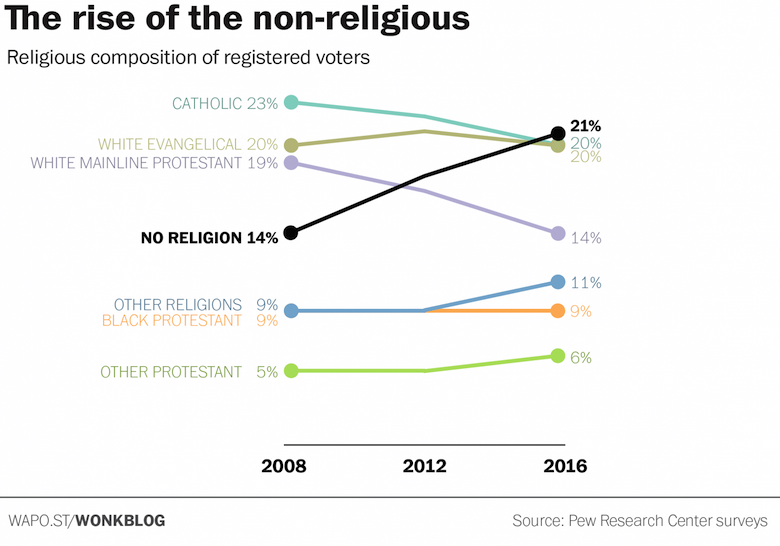The Washington Post highlights some interesting results from a new Pew Research Center Survey about atheism and the electorate, the key one being that their has been a dramatic rise in the number of people who say they are not religious when compared to just eight years ago,
More American voters than ever say they are not religious, making the religiously unaffiliated the nation’s biggest voting bloc by faith for the first time in a presidential election year. This marks a dramatic shift from just eight years ago, when the non-religious were roundly outnumbered by Catholics, white mainline Protestants and white evangelical Protestants.
…The growth of the non-religious — about 54 percent of whom are Democrats or lean Democratic, compared with 23 percent at least leaning Republican — could provide a political counterweight to white evangelical Protestants, a historically powerful voting bloc for Republicans. In 2016, 35 percent of Republican voters identify as white evangelicals, while 28 percent of Democratic voters say they have no religion at all.
I find it hard to believe that the number of non-religious has risen so dramatically because unbelief itself has increased. I suspect that it is that more people now feel freer to identify as unaffiliated than before as the stigma around it slowly dissipates. More of us are coming out of the closet, similar to the way that the LGBT community has greater freedom now to be themselves. The catch is that the non-religious tend to vote at lower rates than the religious.
But there are other good signs.
Still, the Pew study finds other evidence that religion may be becoming a less potent force at the ballot box. In 2008, for instance, 72 percent of voters said it was important for a president to have strong religious beliefs. That number is down to 62 percent today.
Similarly, Americans see religious institutions as playing a smaller role in the public sphere. In 2008, 75 percent said that churches and other houses of worship contributed a great deal to solving social problems. Today, that number has fallen to 58 percent.
Pew also has a list of 10 facts about atheists. Item #2 says that atheists skew younger and male than the general population. Oddly, item #4 finds that 8% of those who call themselves atheists also say they believe in God or a universal spirit and 2% even say they are absolutely certain about it. This strangeness goes the other way too, with 9% of the population saying they do not believe in God or a universal spirit and yet only 3% actually calling themselves atheist. That last discrepancy may due to a still residual stigma surrounding the word atheist, as can be seen in item #8 where atheists rank at the bottom (along with Muslims) on the scale of being liked.
You can see more detailed survey results about how religious beliefs influence the current election here which finds that white evangelicals are even more supportive of Donald Trump than they were of Mitt Romney in 2012, though Romney surely seems more authentically religious than Trump. But what drove many evangelicals to vote for the Mormon Romney in 2012 or for the dubiously religious Trump this year, despite misgivings about them both being not truly evangelicals, is opposition to Obama and Clinton.
Basically the lesson is that evangelicals overwhelmingly vote for reasons like gun policy, the economy, terrorism, immigration and abortion rather than religion.


Wasn’t there another study that found people sooner trusted pedophiles than atheists?
As your co-blogger Kevin Davis just pointed out, the people at WaPo had to split the religious population into arbitrary subgroups and lump the (so-called) non-believers all together to make the latter into a plurality.
Just why they felt the need for that particular bit of minor sensationalism might make an interesting story, but don’t expect to read it in the Post.
Pierce,
I think the main point is not that the nonreligious are the largest single group (a dubious claim for the reasons you give) but their rise from 14% to 21% in just eight years.
Mano Singham @ # 3: … their rise from 14% to 21% in just eight years.
A noteworthy phenomenon, to be sure. I had expected the growth curve to level off soon after our very best recruiting agent moved back to Texas to take up painting.
IMHO, a large part is probably due to confusion over semantics. Many people still believe that the proper meaning of the word “atheist” is someone who holds the positive belief that there is no god. Whereas, the historical and still IMO proper definition of “atheist” is simply someone who does not hold the positive belief that there is a god, which includes the “I don’t know” position, and the “there is no god” position. The problem is that Huxley came along, and invented a new word / usage “agnostic”, which has taken intellectual space away from atheism, making many people believe that “agnostic is for people who are in the middle, and atheism is for people who believe that there is no god”. I am particularly irritated by people who argue that “atheism describes the position: there are no gods”.
EnlightenmentLiberal, it’s good that you recognise your opinion should be humble, since it only accounts for one of the two clauses of the observation.
Here is the first clause:
“Oddly, item #4 finds that 8% of those who call themselves atheists also say they believe in God or a universal spirit and 2% even say they are absolutely certain about it.”
(Evidently, a similar proportion of people still believe that the proper meaning of the word “atheist” is someone who holds the positive belief that there is a god)